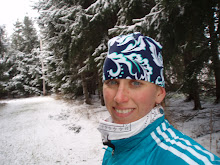 The snow maybe mostly gone for the season but I still have a few stories to share about my adventures this past winter. Bare with me as I play a bit of catch up...
The snow maybe mostly gone for the season but I still have a few stories to share about my adventures this past winter. Bare with me as I play a bit of catch up...Spring series in the North American Nordic world is usually about the last racing event for the year. Traditionally it has been held out West in higher elevations, where the snow tends to stick around a bit longer. This year it was in the East, at Craftsbury. Being in the East already, I was happy to participate in the events, not only as a racer but helping out with another team as well. I know I updated a few times already on this event but this time it isn't about my racing but of my opportunity to help out other racers.
The Adaptive skiing and biathlon programs have seen an amazing amount of growth in the last couple years. The U.S. hosted two World Cup in the Midwest this past season. Both of which were a great success. Our National team is growing stronger by the minute and programs across the country are calling in new recruits left and right. It only seemed natural that Spring Series to add an adaptive category to the mix. And somehow in the organization of this event I was asked if I had interest in helping out with the adaptive races to be held at Spring Series. I obviously said yes, and I am so very glad I did.
The Adaptive event at Spring series was a mini-tour, much like the other races. This means that there area number of races in a row, where the results are added cumulatively in the end creating an overall winner. This event consisted of three races; a prolog, a distance race and a sprint. Among many other things, I learned quickly while helping out that organizing an event for these athletes has you take a lot of additional factors into consideration. Creating a course that is challenging yet safe and doable for those in both a sit ski and the stand up skiers is not an easy task, especially when you are limited to a very small loop to begin with. Despite this challenge we were able to come up with a different course for the athletes each day. And, for the most part, I think they were all happy about it.
The Nordic world in the U.S. is fairly small. You don't have to be involved in it for too long before most faces and names become familiar. Working with the Adaptive athletes gave me an opportunity to work with athletes with totally different backgrounds, which was a really cool experience. Each athlete has his or her own unique challenges to overcome, adding another huge task to each athletes already full plate of simply competing at their very best. The specifics of each sit skiers "bucket", (a new term I learned for what I called their sit ski), has to be just right and fit just for them. I relate this to fitting a rifle for a biathlete, also a very specific fit that often takes years to get just right. Much of what is fairly streamlined for stand up skiing is still very much a work in progress for those racing in the sit ski division. This includes everything from finding the best length of pole, ski technique, flex of ski, and binding system. My mind is spinning just thinking about all of this!
One of the things that amazed me most about these athletes during this event is that when they faced with questions about equipment and technique, last minute changes in race course and distance and additional challenges with equipment, took it all in stride. They kept their focus and worked hard racing and even had huge grins on after their races. Well, maybe not immediately after, but soon after they had recovered! :) It was a great reminder to me what sport is all about. Learning how to best work with your body to have the best performance you are capable of, no matter what the circumstances around you may be. This group of athletes racing were working hard to do just that and I was inspired by watching it. Many thanks to them and the organizers and program directors for giving me the opportunity to do so. Hope to help out again sometime.
More to come. Until then... think spring! Because there isn't any snow left and 40 degrees and rain doesn't make for fun outdoor activities! Bring it on sunshine!!! I'm ready!
cheers,
BethAnn



No comments:
Post a Comment